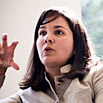 |
 |
 |
 |
 |
 |
 |
|
Master in Teaching Math and Science (MTMS)
SCHOOL OF EDUCATION
The Master in Teaching Mathematics and Science (M.T.M.S.) degree is a 60 graduate-credit, internship-based program of study leading to recommendation for Washington State Residency Certification. The M.T.M.S. degree is designed for candidates seeking to teach at the middle, junior high, and senior high school levels in one of the following endorsement areas:
Although similar to other SPU teacher certification/master's degree programs (e.g., ARC, M.A.T.), the M.T.M.S. differs in that several of the courses are tailored specifically to pedagogy and methodology appropriate for math and science rather than a general curriculum applicable to any subject area endorsement. Intensive Field-Based Learning in Schools The M.T.M.S. is a cohort-driven, full-time, field-based degree. The M.T.M.S. offers classes in three formats and takes 14 months to complete, running continuously from summer through summer (five quarters). Except for the summers, and one night a week during the school year, remaining coursework takes place either online or in a school setting. The traditional on-campus classes meet Wednesday nights, 4:30-9 p.m. The online courses allow candidates to engage in virtual learning and benefit from asynchronous discussion formats. The field-based classes allow candidates to observe course concepts applied in the classroom and to engage professionals in learning-focused discussions.
The M.T.M.S. internship follows a co-teaching model where a mentor teacher and a teacher candidate are both actively involved and engaged in all aspects of instruction. As a team, they share the planning, organization, delivery, and assessment of instruction. Program Benefits School districts with job openings are known to seek Seattle Pacific graduates for both their competence and their character. Completing SPU's M.T.M.S. degree gives you a competitive edge in the marketplace. Other benefits of the program include:
Courses of the Program Experience Teacher candidates who enter the M.T.M.S. program with a graduate degree from a regionally accredited university will need only to complete the certification component, the M.T.M.S. “Core” component and EDU 6085 to receive a second master's degree.
Contact Dr. Greg Gelderman at 206-281-2376 or geldeg@spu.edu if you are interested in the M.T.M.S. program but did not complete a major in one of the above areas as part of your baccalaureate degree. APPLICATION REQUIREMENTS
Financial Aid is available for qualified applicants through Student Financial Services. << Back to 2011-12 Graduate Catalog Home
2011-12 Graduate Time Schedule | Academic Calendar | Graduate Homepage |
 |


